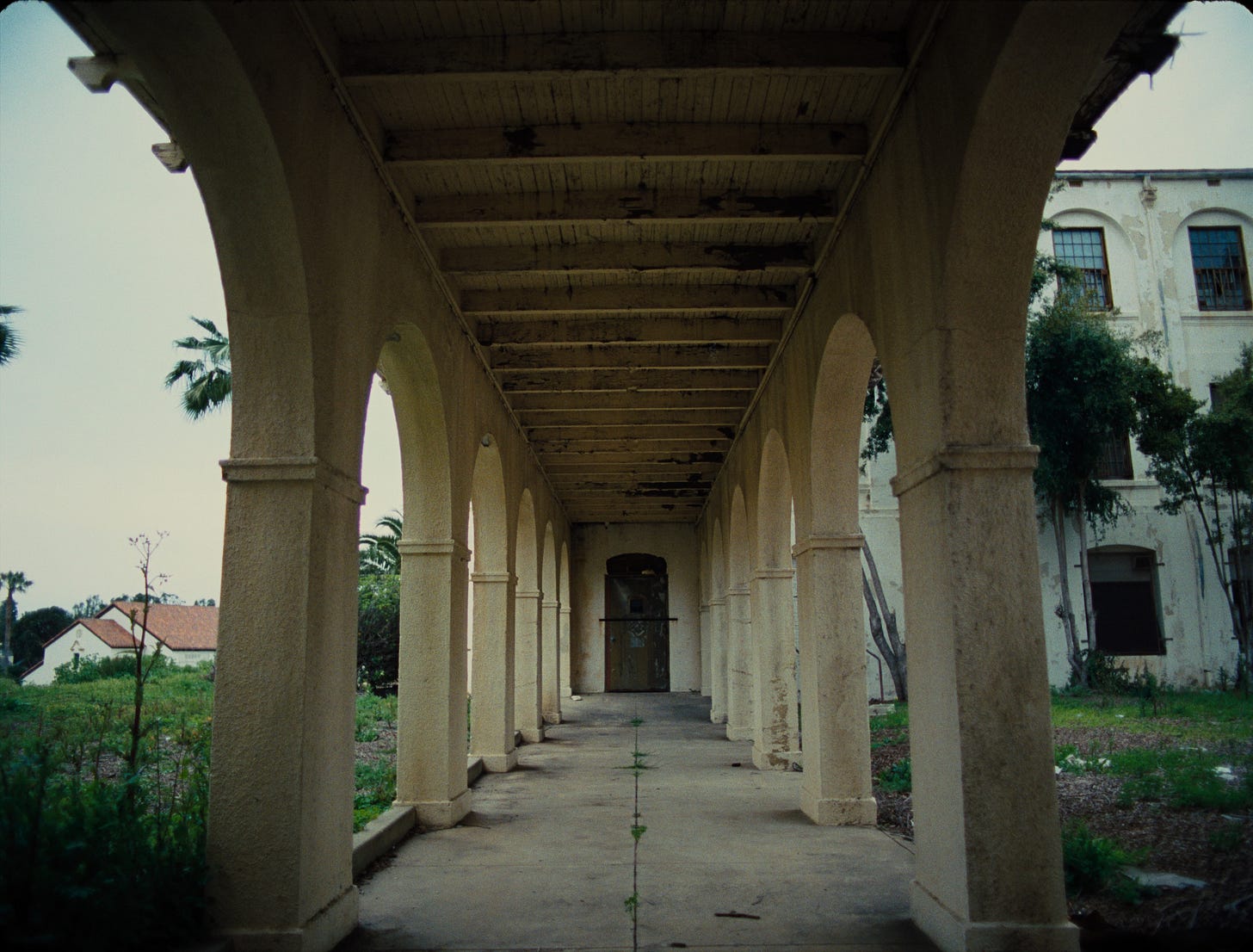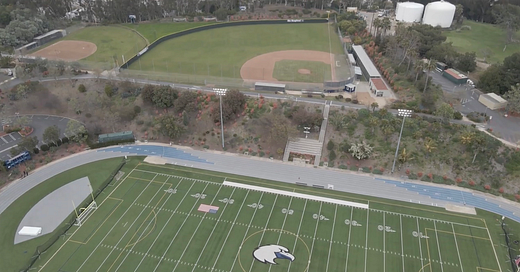Day 7: Brentwood School takes the stand
Former director Braverman acknowledged the school's lease was found to not principally benefit veterans by the VA’s Office of the Inspector General. Also, HUD's policy change wilts under scrutiny.

Another school athletic facility located on the West Los Angeles Veterans Affairs campus drew significant attention on the seventh day of testimony in Powers v. McDonough, a day after the plaintiffs took aim at UCLA’s baseball field.
Questioned by the defense counsel, former Medical Center Director Steven Braverman, taking the stand for a third consecutive day, defended the VA’s lease agreement with the Brentwood School, which operates an athletic complex on 22 acres of the West LA VA campus.
The complex includes football and baseball fields, a pool, a basketball court and other amenities which veterans may use during selected hours. The school also provides “in-kind contributions” like maintenance to the buildings and facilities, food donations to veterans, a shuttle service, and scholarships to the school for children of veterans.
“We don't have the funds for a shuttle service, for example, that is allowed to shuttle people who are not eligible for beneficiary travel,” Braverman said. “But the Brentwood School can do that on the campus, which has been beneficial.”
Braverman acknowledged that the lease was found to be out of compliance with leasing laws by the VA’s Office of the Inspector General because it does not principally benefit veterans.
“(The OIG says) it could be terminated or resolved, but they won't tell us how to resolve it, and that's part of the challenge,” Braverman said. “I believe it could be improved.”
“Do you believe that the costs to the VA, of terminating the Brentwood School lease, would be greater than the benefits that the VA currently receives from that?” asked defense counsel.
“Yes,” answered Braverman.
Later in the day, questioned again by Mark Rosenbaum, Braverman again said the OIG would not tell the VA “what it would take to be in compliance.”
“The OIG report points out the defects,” Rosenbaum said.
Braverman said that the VA disagreed with the OIG regarding the in-kind contributions.
“…That’s not going to be fixed,” he said.
A tale of two Inspector General reports

In 2018, the Office of the Inspector General issued a scathing report that found that UCLA and Brentwood School paid dramatically less than the independently appraised value of land. The report further found that Brentwood School violated its lease terms under 2016’s West Los Angeles Leasing Act, citing figures showing that only 67 veterans had used the athletic facilities. In 2021, the OIG again found that Brentwood was still not in compliance with the West LA Leasing Act.
For more, read Part Five of Home of the Brave, “The Old Guard and the New Fight.”
After asking about the Brentwood lease, the defense moved back to the lease with UCLA and asked Braverman if the VA could knock down Jackie Robinson Stadium if the lease were terminated.
It might be considered a historical site but I don’t know for a fact, Braverman said.
Judge Carter interjected and noted that the original American Legion stadium had been demolished before the construction of the newer facility, which was opened in 1981.
“How is that a historical site?” Carter asked.
“It could be an old wives tale,” Braverman said.
Questioning then turned to the overall budget for the VA nationwide, as it pertained to funds available for construction projects.
Braverman testified that “major construction projects” like those at massive medical centers were budgeted at around $2 billion and came out of the VA’s overall budget.
An overhaul of the Greater Los Angeles critical care tower, which includes new emergency and operating rooms, was budgeted for around $1.4 billion.
The defense asked if there there were any other sources of funding. “For major construction that’s really the only source,” Braverman said.
Braverman also testified that the 1,000 units of temporary housing called for in the Master Plan would take up approximately 24 acres.
“What happens if it’s double-storied?” Carter asked.
“It would be less of a land use requirement,” Braverman responded.
“That’s very simple,” Carter said.
Braverman also testified about what he believes are other challenges for a high volume of housing VA land. “One of the challenging issues is the notion that every unhoused veteran needs to be housed on the West LA campus,” he said.
The challenge with having everybody housed in one area puts people at a safety risk, Braverman said.
“We’ve already seen at (buildings) 205, 208, 207, more than a 200% increase in crimes and security calls not only in building areas but across campus,” Braverman said, also noting that the campus police vacancy rate is 47%.
“Not to malign anybody but these are just the statistics,” he added.
Who killed Andre Butler?
He was born on Independence Day, joined the Marines, and died as a disabled man living in a tent on the streets of Los Angeles. But this veteran’s death sentence came long before he set up camp outside a federal property that was founded to house service members like him.
Who killed Andre Butler? Learn more by reading his story in Part One of Home of the Brave.
The plaintiffs also called Gennifer Yoshimaru, assistant head of the Brentwood School.
Yoshimaru testified that the school (which charges tuition of $45,000 for elementary school students and $53,000 for middle and high school students) had attempted to find an alternate site to house its sports teams after a judge ruled that the sharing agreement between the VA and the school, which allows for the VA to use the sports facilities, was illegal under federal law.
The plaintiff’s counsel noted that the school had retained attorneys after the finding.
“All to the end of getting that law amended?” Rosenbaum asked.
All to the end of continuing our relationship with the VA, Yoshimaru answered.
Rosenbaum repeated the question. The defense objected on the grounds that the question had been asked and answered and was argumentative.
Carter overruled the objection.
“All to the end of getting that law amended?” Rosenbaum asked again.
“Yes,” Yoshimaru answered.
When questioned by the defense, Yoshimaru touted the school’s efforts to be responsive to veteran requests and suggestions.
“Our goal is to outperform the commitments we make,” she said. “We do not want to do the bare minimum.”
When asked by Carter about how the school would handle “volatile veterans” near the school, Yoshimaru said the school entered into the “partnership” with the understanding of who would be served.
Spotlight on Brentwood School

Brentwood School was founded in 1972, and in 2001 built what is now called the Veterans Center for Recreation and Education (VCRE) on the West LA VA grounds. There, the school provides veterans “services in physical recreation, health and wellness, education, as well as a range of special programs and events, all on facilities built and maintained by Brentwood School,” according to its website, published as early as September 2019 — which did not mention that the land is leased from the VA. An updated website appearing more than four years later — after veterans brought new legal challenges to its lease — states, “the rent Brentwood School pays for its 22-acre lease is required by law to stay local and be used for priorities at the West LA campus, including housing and emergency shelter, construction, maintenance, and renovation.” The school’s annual rent comes to $850,000 per year, with required in-kind services of $918,000, which the school has regularly exceeded by holding events for veterans and their families, including movie screenings, picnics, food and clothing drives, educational services, transportation, and scholarships.
Functionally, the VCRE facilities are used by students and staff, with veterans allowed in only for limited windows — even though the school’s use of the land is explicitly required to be “veteran-centric.” Veterans are given access to the swimming pool, for instance, every Monday, Wednesday, and Friday between 5:30 and 7:30 a.m. In 2023 there were 5,883 visits by a total of 1,329 veterans, the school reports.
Since 2014, the elite academy has dropped nearly $1 million on a white-shoe Washington lobbying firm. Last year, a bill floated by an Oregon U.S. House member included an amendment for Brentwood that mirrored UCLA’s deal to secure land on the West LA VA campus. To the frustration of veterans’ advocates, the VA testified in support of the Brentwood amendment, though it got cut from the bill before the House passed it in December.
For more, read “Carving up the Map,” Part Four of Home of the Brave.
Near the close of the day, the plaintiffs called Michael Seeger Dennis, senior program advisor at HUD, to testify.
Dennis testified about some of the barriers to implementation for the rule change proposed by HUD last week that would end veterans’ disability payments from being considered in housing income requirements.
The Department of Treasury, for instance, could not make a coinciding change regarding eligibility requirements for homes and apartments built using low-incoming housing tax credits.
“Nothing prevents HUD from retracting this policy change tomorrow, does it,” asked plaintiffs attorney Amanda Mangaser Savage.
“No,” Dennis answered.
Proceedings for Powers v. McDonough will continue with testimony from Dennis on Thursday, August 15 at 8:00 a.m.







